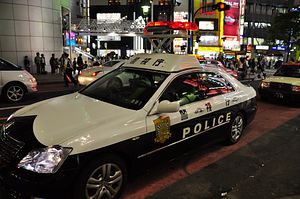On August 1, Japan opened a counterterrorism information center. The purpose of the center is to better enable government entities to exchange information and strengthen anti-terrorism measures in the lead-up to the 2020 Olympics and Paralympics in Tokyo. Eleven government entities are involved in the project, including the National Police Agency, the Foreign Ministry, the Defense Ministry, the Public Security Intelligence Agency, and the Japan Coast Guard.
The new center has been in the books since last December when the government approved a set of counterterrorism guidelines. According to Mainichi Shimbun, the center will focus on “Islamic militants and other perceived threats.”
Since September 11, Japan has stood beside the United States in the “global war on terror” – perhaps without fully understanding the consequences of its participation, as David Leheny speculated in 2001. In Tokyo’s eagerness to stand strong beside its ally, Japanese policymakers ran the risk of disappointing Washington if expectations had been raised too high of what Japan would be willing and able to contribute.
As Peter Katzenstein also analyzed contemporaneously in 2003, in comparison to the U.S. view of September 11 as an act of “war,” Japan viewed the attack as a “big event,” an event “that offered an opportunity to show symbolically that Japan was part of the war against terrorism and to prepare Japan better for a national emergency.” Yet in practice, similar to Japan’s response to the 1995 sarin gas attacks by the Aum cult, Japan’s counterterrorism policy – beyond symbolic foreign policy moves – was “tepid” and “muted,” especially domestically.
After a decade’s worth of progress, Juan Zarate more optimistically appraises Japan’s counterterrorism efforts, especially in a regional and international context. Of note, many of the comparative advantages that Zarate commends Japan for having are advantages that matter regionally and internationally, not necessarily domestically. His 2016 list of initiatives that Japan should pursue to maximize its counterterrorism comparative advantages includes: investment and aid “to shape environments that are susceptible to violent extremist exploitation”; capacity-building “to improve efforts at border controls, financial regulation, and preventative law enforcement”; and so on. Such efforts would indeed make the world — but not necessarily Japan — a safer place if Japan pursued them more vigorously.
Japan’s attitude toward terrorism seems to still bifurcate the world between a dangerous “outside” and safe “inside.” In hostage crises in the past, the Japanese government has even blamed the victims for acting irresponsibly and traveling to dangerous areas. Even now, two years after the Dhaka terrorist attack that killed seven Japanese nationals, Japan has not lifted its travel alert to Bangladesh, reflecting the idea that it is better to simply not engage with dangerous parts of the world.
It is difficult to say whether this complacency comes from an accurate threat assessment of Japan’s internal situation, or “wishful thinking” that comes from a desire to not have to deal with these problems. When it comes to domestic counterterrorism policies, Japan is handicapped. For example, as prosaic as this concern might be, one of the biggest limitations on the Japanese police is the lack of critical language abilities. And unlike multicultural societies like Great Britain, Japan does not have the option of simply hiring more Japanese who speak critical foreign languages.
The Olympics and Paralympics – as great a burden they impose on Tokyoites – are intended to force reforms and improvements in Japan. “2020” is a slogan to push for change and to clean house, so to speak. Perhaps the Olympics and Paralympics can do what September 11 failed to do: force the creation of an effective counterterrorism regime to deal with threats against Japan itself.

































